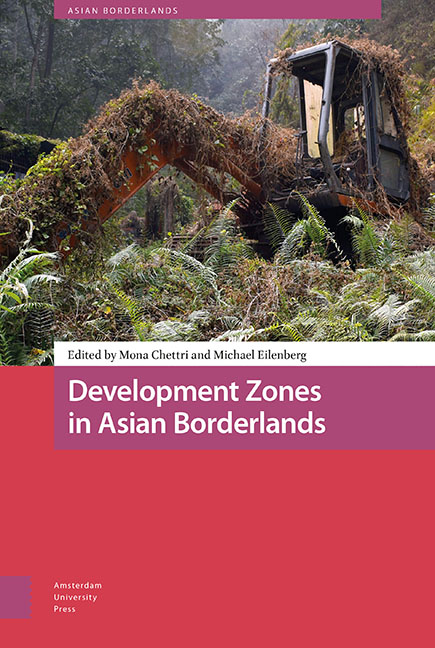Book contents
- Frontmatter
- Contents
- List of Figures and Tables
- Acknowledgements
- Introduction: Enclave Development and Socio-spatial Transformations in Asian Borderlands
- 1 Post-disaster Development Zones and Dry Ports as Geopolitical Infrastructures in Nepal
- 2 Onwards and Upwards: Aerial Development Zones in Nepal
- 3 Casinos as Special Zones: Speculative Development on the Nation’s Edge
- 4 Thinking the Zone: Development, Climate, and Heterodystopia
- 5 From Shangri-La to De facto SEZ: Land Grabs from “Below” in Sikkim, India
- 6 Development Zones in Conflict-Affected Borderlands: The Case of Muse, Northern Shan State, Myanmar
- 7 Smart Enclaves in the Borderland: Digital Obligations in Northeast India
- 8 Post-Disaster Economies at the Margins: Development, Profit, and Insecurities Across Nepal’s Northern Borderlands
- 9 Development from the Margins: Failing Zones and Suspended Development in an Indonesian Border Village
- 10 From Boom to Bust – to Boom Again?: Infrastructural Suspension and the Making of a Development Zone at the China-Laos Borderlands
- 11 Genealogies of Extraction: De Facto Development Zones in the Indonesian Borderlands
- Notes on Contributors
- Index
10 - From Boom to Bust – to Boom Again?: Infrastructural Suspension and the Making of a Development Zone at the China-Laos Borderlands
Published online by Cambridge University Press: 18 June 2021
- Frontmatter
- Contents
- List of Figures and Tables
- Acknowledgements
- Introduction: Enclave Development and Socio-spatial Transformations in Asian Borderlands
- 1 Post-disaster Development Zones and Dry Ports as Geopolitical Infrastructures in Nepal
- 2 Onwards and Upwards: Aerial Development Zones in Nepal
- 3 Casinos as Special Zones: Speculative Development on the Nation’s Edge
- 4 Thinking the Zone: Development, Climate, and Heterodystopia
- 5 From Shangri-La to De facto SEZ: Land Grabs from “Below” in Sikkim, India
- 6 Development Zones in Conflict-Affected Borderlands: The Case of Muse, Northern Shan State, Myanmar
- 7 Smart Enclaves in the Borderland: Digital Obligations in Northeast India
- 8 Post-Disaster Economies at the Margins: Development, Profit, and Insecurities Across Nepal’s Northern Borderlands
- 9 Development from the Margins: Failing Zones and Suspended Development in an Indonesian Border Village
- 10 From Boom to Bust – to Boom Again?: Infrastructural Suspension and the Making of a Development Zone at the China-Laos Borderlands
- 11 Genealogies of Extraction: De Facto Development Zones in the Indonesian Borderlands
- Notes on Contributors
- Index
Summary
Abstract
The Boten SEZ at the China-Laos border is undergoing major development as part of China's Belt and Road Initiative (BRI). Its story goes back to 2007 when Boten opened as a land concession for a Chinese hotel-casino complex. Yet crime and mismanagement led to its abrupt closure in 2011, when most people left. This chapter is based on research in Boten in 2015-2017, between the zone's first failure and its current boom. After introducing the history of Boten I show how “waiting” for development became an embodied trope for those living in the SEZ throughout this period. Secondly, I engage with the notion of “suspension” as an analytical device to address development zones in the context of China's global ambitions.
Keywords: suspension, BRI, development, SEZ, Boten, Laos
For five years, this remote town on the China-Laos border has lived in the shadow of more prosperous times. […] But Boten's luck may be about to turn once again.
– New York Times, 6 July 2016The two tropes of “boom” and “bust” are recurrent in analyses of frontier capitalism across Asia's borderlands. Liminal spaces par excellence, borderlands seem to experience periods of frenetic (and often illicit) activities, when people move in, fortunes are made, and promises of further development amplified. Often, however, such “boom” phases are followed by a period of government crackdown, or overall decline due to fluctuations in the market. As the “bust” settles in, formerly (and briefly) prosperous outposts turn, once again, into semi-deserted out-of-the-way places, where stories about the “good old days” are subjects of daily conversations. The social sciences literature on Asian borderlands has, indeed, captured a significant variety of such stories of boom-to-bust (cf. Horstmann, Saxer and Rippa 2018; Tsing 2005). In this chapter I contribute to this body of scholarly research by addressing the case of the Boten Special Economic Zone (SEZ), at the Laos-China border. Boten is currently undergoing major development as part of China's Belt and Road Initiative (BRI). Starting in 2017, China Railway, a state-owned enterprise (SOE), set up offices in Boten to manage the construction of the northern Laos section of the China-Laos high-speed railway project. Since then Boten has doubled its size and now features two large office towers, a railway and a bus station, and a new shopping mall. Yet the story of Boten pre-dates the construction of the China-Laos railway and the BRI.
- Type
- Chapter
- Information
- Development Zones in Asian Borderlands , pp. 231 - 252Publisher: Amsterdam University PressPrint publication year: 2021



